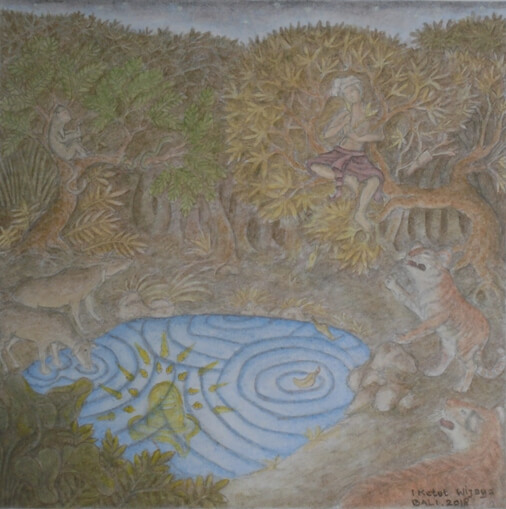Siwaratri Day is one of the holy days in Hindu. This day is devoted to worshiping Ida Sang Hyang Widhi Wasa in the manifestation as Shiva. Balinese believes that this is a good time for self-introspection and meditation, invoke for the guidance of Shiva to achieve higher self and always be spiritually aware in the face of life.
Siwaratri in Bali
Siwaratri is derived from the word "Siwa" and "Ratri". Siwa in Sanskrit means kindhearted, hopeful, and forgiving. While Ratri means night or dark. Both form the word "Siwaratri", which can be interpreted as a night of pure contemplation to find a higher self-awareness.
Siwaratri ceremony is celebrated on the fourteenth day of the dark half of the Sasih Kapitu, a day before Tilem (New Moon) on the 7th months in the Balinese Calendar. On that day it is believed to be the darkest night of the year and often called the Night of Shiva. On this day, Balinese will perform prayer at the family's temple, followed by the implementation of Brata Siwaratri, as follows:
- Mejagra is stay awake, no sleeping. It teaches to always be conscious both physically and spiritually in living a life. Implemented for 36 hours, from 06.00 to 18.00 in the next day.
- Upawasa is fasting, no eating and drinking. It teaches to apply self-control, which is controlling the greedy and selfish nature. Implemented for 24 hours, from 06.00 until 06.00 in the next day.
- Monabrata is keep silent, no speaking. It teaches to speak carefully, not impulsive and always honest. Implemented for 12 hours, from 06.00 to 18.00 in the same day.
Brata Siwalatri is divided into 3 levels: Simplest, Medium, and Highest. The simplest level is mejagra. The middle level is mejagra and upawasa. While the highest level is mejagra, upawasa and monabrata. The implementation is tailored to the ability of each individual. The Brata Siwaratri teaches to always maintain self-awareness at any time in all situations.
Siwaratri Kalpa
In Bali, the Siwaratri celebration is mentioned in one of the ancient literatures. The literary work is named Siwaratri Kalpa, compiled by Mpu Tanakung. The literature told a story of a man named Lubdhaka, his daily job is hunting. Everything he obtained from hunting is used to support the child and his wife.
One day Lubdhaka went to the forest for hunting. Told that time was the fourteenth day of the dark half of the seventh month. During the hunting, he encountered nothing, while the day was late. As he walked, he found a pond with clearly water. Lubdhaka did not dare to go home for fear of the wild tigers, and he decided to stay in the forest. He saw the bael tree grow thrives on the edge of the pond and climbs it.
Lubdhaka now assailed by drowsiness and was afraid he would go to sleep, fall from the tree, and be killed by wild animals. He looks for a means of staying awake; he plucked the leaves of the bael tree and continually dropped them in the water. Unwittingly in the midst of the pond, there is a Lingga of Shiva, and there the leaf stops.
Lubdhaka made it through the night without sleep, and the dawn began to appear in the sky. He prepared to return home, he arrived at home in the afternoon and was greeted by his wife. The next day went as usual and he enjoyed living with his family.
A few years later Lubdhaka got a chronic ill, getting worse day by day, and finally the breath of life left his body. Then the cremation ceremony was held for him until finished, by family and relatives. Now the soul of the hunter found himself wandering aimlessly in the sky.
It is seen by Lord Shiva and Lord Yama, both sides send troops to pick up the soul of Lubdhaka. Shiva wants the soul of Lubdaka brought to Shiva Loka, otherwise Yama wants the soul of the hunter brought to Hell. There was a fierce battle between the two sides, the troops of Yama suffered defeat, and Lubdhaka was brought by troops to Shiva Loka.
Yama's troops returned, reporting their defeat, and now in pathetic condition. God Yama was angry and did not understand it, because it was Shiva who assigned him to distinguish good and evil, and bring the evil to hell. Yama tried to find out whether Lubdhaka had done a good deed in which he could escape punishment, but did not find it.
Yama and his servants immediately head for Shiva's place, which is mentioned at the peak of Mount Kailasa. Shiva welcomed the arrival of Yama, and then explained the reason for the soul of Lubdhaka to enter Shiva Loka because he has performed the highest brata. Shiva had taught the brata of the Night of Shiva, which has the consequence that all evil deeds of a person have been removed and will go to the Shiva Loka to enjoy the highest bliss.
Then Lubdhaka will receive a reward, even though the observance or brata was unintentional. Shiva also explained about the rules of brata during the Night of Shiva. Later, Shiva sent Yama back to continue the work and revive all those killed during the war. Yama admits his mistake, apologizes, and then say goodbye.
Reference
- google.co.id
- wikipedia.org _ Siwaratri _ on January 15, 2018
https://id.wikipedia.org/wiki/Siwaratri - wikipedia.org _ Kakawin Siwaratrikalpa _ on January 15, 2018
https://id.wikipedia.org/wiki/Kakawin_Siwaratrikalpa - Tanakuṅ.; Teeuw, Andries.; Robson, S.O.; Galestin, Theodoor Paul (Jun 29, 2013). "Śiwarātrikalpa of MPU Tanakuṅ: An Old Javanese poem, its Indian source and Balinese illustrations". Volume 3 of Bibliotheca Indonesica. Springer. ISBN 9789401194297. Retrieved January 15, 2018.
- Image : Original Collection
Searches on this site related to Siwaratri in Bali:

No comments:
Post a Comment